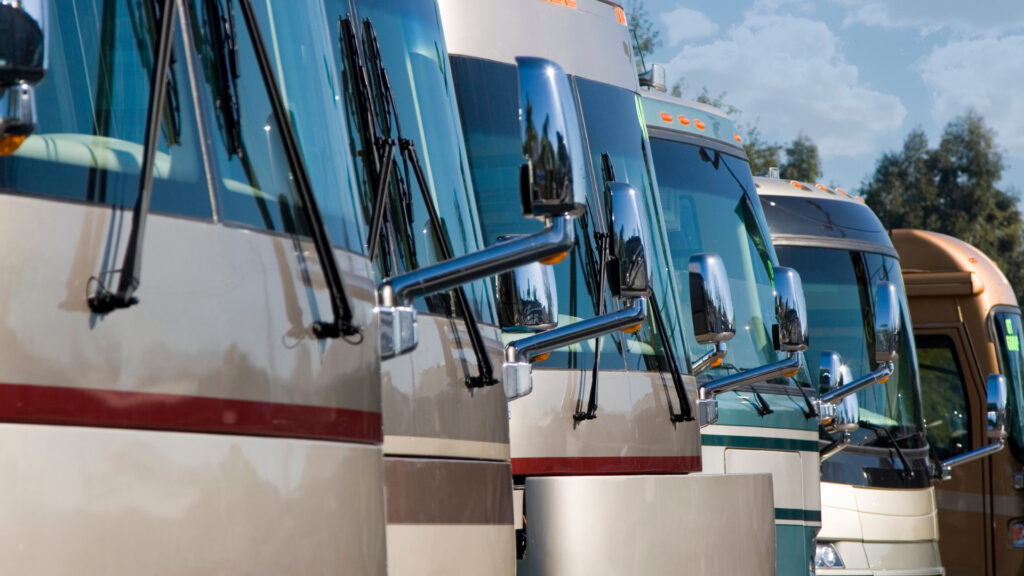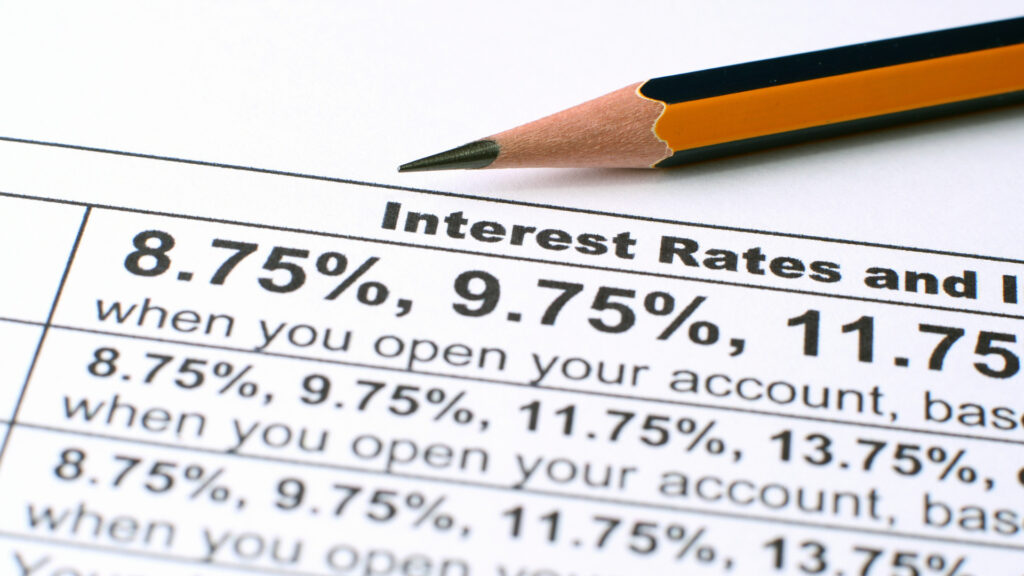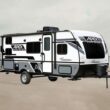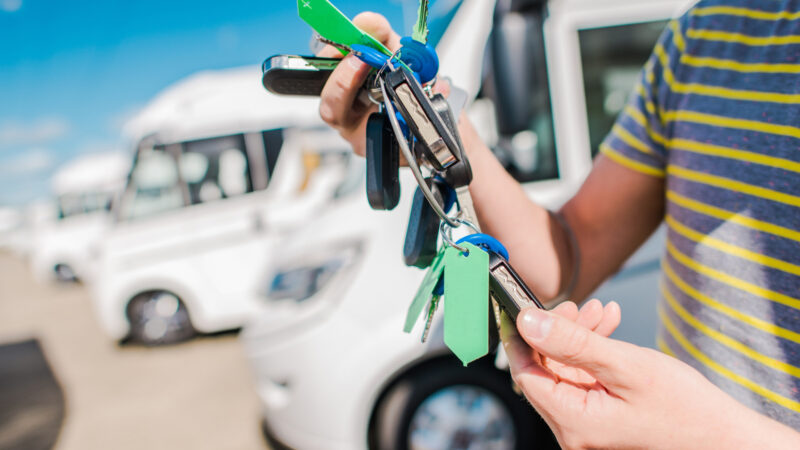Table of Contents Show
You may be in for a surprise if you’re thinking about RVing and haven’t checked out the price tags lately. You don’t have to look hard to find rigs that cost well over $100,000, especially if you’re considering a motorhome.
Most people finance their RVs, but some financing options still require a large down payment. So is it possible to get an RV with zero-down financing?
Today, we’ll share everything you need about RV financing and whether zero-down is worth considering. Let’s get started!
What Is RV Financing?
Like many other large purchases, RV financing is a loan a buyer secures through a bank, credit union, or other financial institution. The funds from the loan cover the RV purchase, and the buyer pays back the loan over a certain amount of months or years.
These loans may require a down payment, but that’s not always the case. Buyers agree to a certain interest rate, loan term, and monthly payment when securing the funds.
The purpose of RV financing is to allow individuals to purchase an RV without paying the full cost upfront.
Is It Hard to Finance an RV?
Financing an RV can be challenging because many banks and financial institutions see them as luxury purchases. Like many other loans, a variety of factors go into obtaining RV financing.
The difficulty greatly depends on your credit score, income, debt-to-income ratio, and the age and condition of the RV you purchase.
Those with a good credit score, stable income, and a manageable debt-to-income ratio may find it easier to secure RV financing. However, you may face more difficulty obtaining financing if you have a low credit score, limited income, or a high debt-to-income ratio.
It’s best to shop around and compare offers from different lenders to find the best terms for your situation. Additionally, you can improve your credit score and debt-to-income ratio before applying for RV financing to get the best financing possible.
Is Zero-Down Financing Available for an RV?
Some financial institutions offer zero-down financing for RVs.
However, some lenders offering zero-down options may require higher monthly payments or interest rates to minimize their risks of funding a bad deal. This financing option can be dangerous for both the lender and the buyer.
Zero-down financing can be a good option for individuals wanting to purchase an RV without a large upfront payment. Still, it’s important to consider the total cost of the loan, including interest and fees over the life of the loan.
Before accepting a zero-down financing offer, carefully review the terms and conditions of the loan, including the interest rate, loan term, monthly payments, and any additional fees or charges. It’s also good to compare multiple-lender offers to find the best deal for your situation.
What Is the Typical Down Payment on an RV?
Down payments vary widely from one transaction to the next. The down payment typically depends on the cost of the RV, the lender’s requirements, and the borrower’s financial situation. Generally, a down payment of 10% to 20% of the purchase price is typical for RV financing.
Some lenders may require a higher down payment, while others may accept a lower one, especially for borrowers with excellent credit. The down payment size can affect the loan terms, such as the interest rate, loan term, and monthly payment.
Before signing on the dotted line, consider the total cost of the loan. While it may seem like a great deal now, you could end up paying more than necessary in interest and fees over the life of the loan.
Reasons to Consider Zero-Down RV Financing
Zero-down RV financing may be worth considering in a couple of situations.
If you find yourself in either of these situations, research and consider all your options before deciding.
You Don’t Have Wads of Cash on Hand
RVs can be incredibly expensive, and the down payments can be massive hurdles that prevent many people from purchasing a rig.
A zero-down RV loan can make sense if you’re set on RVing and don’t have enough money in the bank for a down payment.
Not everyone has $5,000 to $10,000 available to put down when purchasing an RV. In these situations, a zero-down loan may be the only option.
You Plan to Pay off the Rig Soon
Another reason to consider zero-down RV financing is that you plan to pay off the rig soon. We’re seeing more and more people selling their homes and living out of their RVs. If that’s your plan, you may walk away from the sale of your home with enough to pay off the loan you took out on your RV.
If you pay the loan off within a few months, you likely won’t pay that much in unnecessary fees or interest. Pay off the loan as quickly as possible once you have the funds to avoid flushing any hard-earned money down the drain.
Keep in Mind: When you’re buying an RV, make sure you consider these 5 Things before signing the dotted line.
Reasons to Avoid Zero-Down RV Financing
While you have a couple of reasons to consider zero-down RV financing, you’ll find more reasons to avoid it.
If you’re unsure whether these financing options are for you, here are some reasons why we think you should avoid them.

Harder to Find Financing
Few financial institutions provide zero-down financing for RVs. Those that do typically have stricter requirements for the approval process, which means you’ll likely need a good credit score.
If you have a lower credit score or any red flags on your credit history, you’ll likely struggle to find an institution willing to take the risk.
Additionally, having several institutions pull your credit report while searching for the perfect rig can be dangerous. If you go this route, you may destroy your credit score and ability to get approved in the future.
In these situations, it might be best to pump the brakes and evaluate what you need to improve your credit to give you the best chance of getting approved.
Likely to Get Higher Interest Rates
If you can find an institution willing to offer zero-down RV financing, it may require a higher interest rate.
While a two or three-point increase may not sound like much or massively affect your monthly payment, it can cost you thousands of dollars over the life of your loan.
For example, a $50,000 loan at 4% interest over 10 years will pay $10,747.08 in interest and have a monthly payment of $506.23. Bumping the annual percentage rate up two points to 6% only increases the monthly payment to $555.10.
However, it’s important to note that it increases the interest paid to $16,612.30. That’s a difference of $5,865.22 over the life of the loan.
As we’ve said, it may seem more convenient or a decent option, but zero-down RV financing can be a significant financial mistake. Always consider the long-term consequences of agreeing to these options.
Keep in Mind: See Where to Find RV Loan Rates and Reliable Financing!

You’re Likely Underwater from the Start
Unfortunately, RVs are like most vehicles and depreciate quickly. When most people pay off their loans, their RVs are worth a fraction of what they were when they purchased them.
Some RVs can lose 30% to 50% of their value in just a few years. By not having a down payment, you’ll likely find yourself underwater on your loan from the start.
Down payments help cover the costs of taxes and other fees associated with the transaction. By not putting any money down, you end up adding to the overall cost and financing several thousand dollars more than your rig is worth.
And, if you’re involved in an accident or need to sell your rig, you may have to pay the bank the difference to dissolve the loan.
Is Zero-Down RV Financing a Good Idea?
Unfortunately, while zero-down RV financing may sound like a good idea, it’s not the best option for most people. While there are some short-term benefits to this type of loan, it can have some negative long-term financial consequences.
However, it’s up to you to determine what is best for you and your financial situation. Research and read the fine print before signing your name and sealing the deal.
What do you think? Does zero-down RV financing sound like a good deal for your situation?






